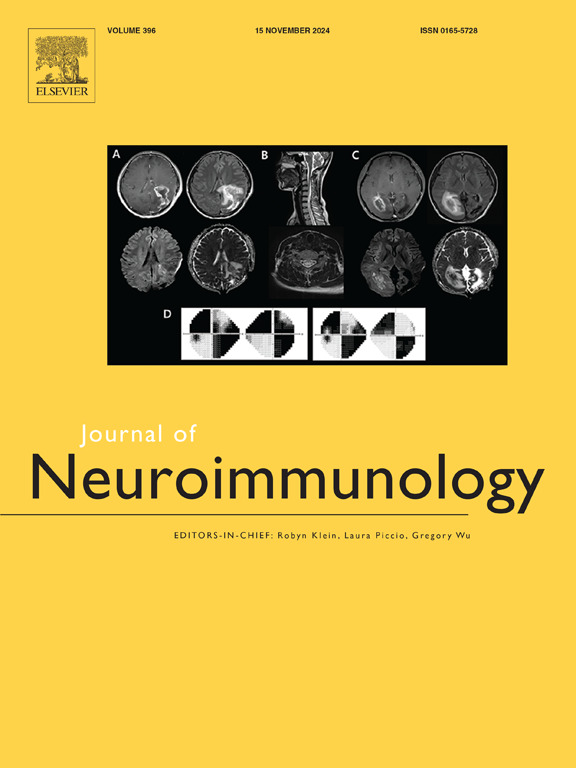eb病毒再激活与初治疗多发性硬化症患者外周血和脑脊液中免疫细胞谱的改变有关
IF 2.5
4区 医学
Q3 IMMUNOLOGY
引用次数: 0
摘要
多发性硬化症(MS)是一种中枢神经系统慢性炎症性脱髓鞘疾病,具有自身免疫性和神经退行性成分,最近与eb病毒(EBV)感染有关。为了研究与多发性硬化症患者EBV再激活(EBV- r)相关的免疫学改变,我们分析了来自首次治疗的多发性硬化症患者的匹配外周血(PB)和脑脊液(CSF)样本中的免疫细胞谱,以及血浆EBV血清学标志物。在我们的希腊多发性硬化队列中,33例患者中有12例(39%)显示EBV-R (VCA IgG+, VCA IgA+, VCA IgM+或EA(D) IgG+)的血清学证据,其中7例血浆BZLF1 mRNA检测阳性,表明溶血性感染。与潜伏性EBV感染患者相比,EBV- r患者外周血中CD19+ B细胞减少,脑脊液中CD19+ B细胞比例相等。相反,EBV- r患者在PB中显示细胞毒性CD56dim NK细胞和CD14+单核细胞增加,而在脑脊液中仍然没有细胞毒性CD56dim NK细胞,无论EBV状态如何。EBV-R期间,PB和CSF中调节性CD56bright NK细胞的比例均降低。我们的研究结果显示,具有EBV-R血清学证据的MS患者表现出免疫反应的改变,在细胞毒性NK细胞扩增的情况下,PB中的B细胞比例降低,而在没有细胞毒性NK细胞监测的情况下,CSF中的B细胞比例不受影响。本文章由计算机程序翻译,如有差异,请以英文原文为准。
Epstein-Barr virus reactivation is associated with altered immune cell profiles in peripheral blood and cerebrospinal fluid of treatment-naive multiple sclerosis patients
Multiple sclerosis (MS) is a chronic inflammatory demyelinating disease of the central nervous system, with autoimmune and neurodegenerative components, recently linked with Epstein-Barr virus (EBV) infection. To investigate immunological alterations associated with EBV reactivation (EBV-R) in MS we analyzed immune cell profiles in matched peripheral blood (PB) and cerebrospinal fluid (CSF) samples from treatment-naive MS patients, in relation to plasma EBV serology markers. In our Hellenic MS cohort, 12 of 33 patients (39 %) exhibited serological evidence of EBV-R (VCA IgG+ with VCA IgA+, VCA IgM+, or EA(D) IgG+), and 7 of these 12 also tested positive for plasma BZLF1 mRNA, indicative of lytic infection. EBV-R patients showed reduced CD19+ B cells in PB and equal proportions in CSF compared to patients with latent EBV infection. Conversely, EBV-R patients showed increased cytotoxic CD56dim NK cells and CD14+ monocytes in PB, while cytotoxic CD56dim NK cells remained absent in the CSF, regardless of EBV status. Proportions of regulatory CD56bright NK cells were reduced in both PB and CSF during EBV-R. Our results reveal that MS patients with serological evidence of EBV-R show altered immune responses, with reduced B cell proportions in the PB in the presence of expanded cytotoxic NK cells, and unaffected B cell proportions in CSF in the absence of cytotoxic NK cell surveillance.
求助全文
通过发布文献求助,成功后即可免费获取论文全文。
去求助
来源期刊

Journal of neuroimmunology
医学-免疫学
CiteScore
6.10
自引率
3.00%
发文量
154
审稿时长
37 days
期刊介绍:
The Journal of Neuroimmunology affords a forum for the publication of works applying immunologic methodology to the furtherance of the neurological sciences. Studies on all branches of the neurosciences, particularly fundamental and applied neurobiology, neurology, neuropathology, neurochemistry, neurovirology, neuroendocrinology, neuromuscular research, neuropharmacology and psychology, which involve either immunologic methodology (e.g. immunocytochemistry) or fundamental immunology (e.g. antibody and lymphocyte assays), are considered for publication.
 求助内容:
求助内容: 应助结果提醒方式:
应助结果提醒方式:


